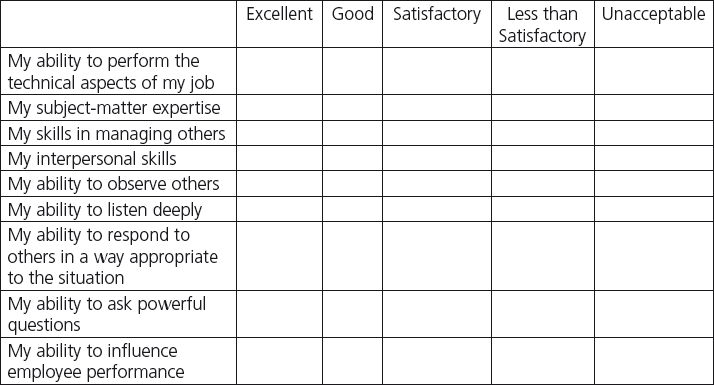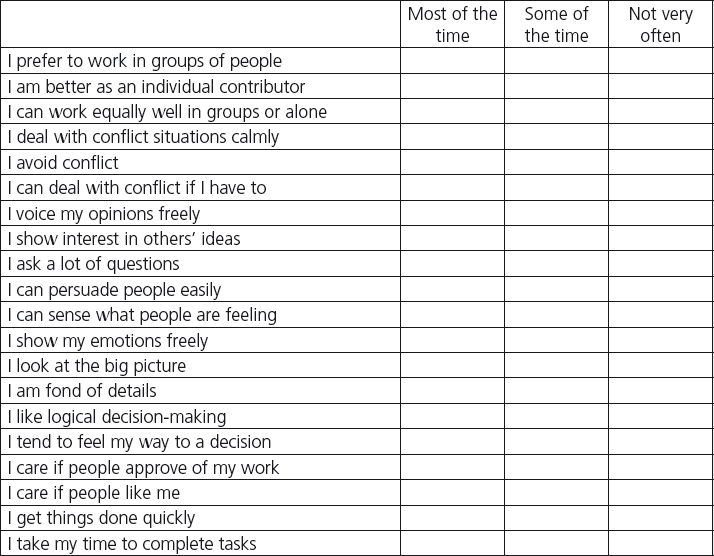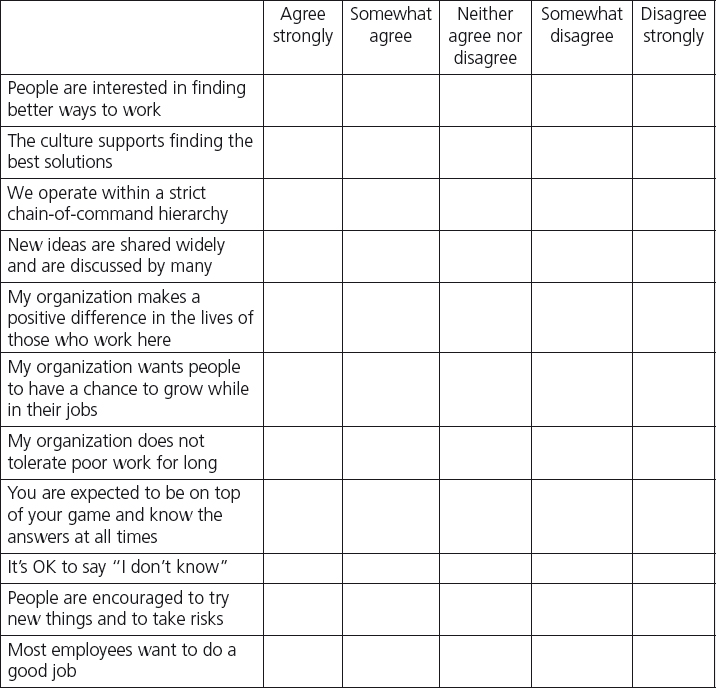CHAPTER 1
It All Begins with You
“We must be the change we wish to see in the world.”
—MAHATMA GANDHI, INDIAN SPIRITUAL AND POLITICAL INDEPENDENCE LEADER
As a well-known saying goes, “No matter where you go, there you are.” Amusing and paradoxical as it may be, the saying is true. After all, it is you who shows up at work every day and you who returns home, listens to music, watches a movie, or goes out with friends. Learning more about yourself is a good starting point for your journey as an anytime coach. What you learn will add to, modify, or replace beliefs, knowledge, and skills you have now.
We first ask you to think deeply about the “self” you bring to Anytime Coaching. You will complete several informal self-assessments that focus on your beliefs about work and managing others, as well as your skills, knowledge, and preferences. Then we encourage you to reflect on what you have discovered. You might even want to retake the assessments once you have implemented some of the Anytime Coaching practices.1
Undoubtedly, you already use some of the skills of Anytime Coaching. As the Anytime Coaching model depicts, the core practices of observing, inquiring, listening, and responding are linked to one another. When anytime coaches employ all four practices, the result is day-to-day performance improvement. Surrounding and supporting these four practices are the additional elements of self-awareness, self-development, neuroscience, and mindfulness.
Who Is the Self I Bring to Anytime Coaching?
Each individual will answer this question differently—but do take some time to answer it. The self-assessments will help you determine your current skills and beliefs, which will influence how you adopt and apply Anytime Coaching skills. The immediate goal is to boost your understanding of your skill as an employee, a manager, or a leader. There will be no “score” for the assessments—just increased awareness of the self you bring to Anytime Coaching.
To begin, the exercises ask that you think deeply about your work, your beliefs about work, your workplace, your employees, and your role as a manager. You will base your new learning about Anytime Coaching on these core beliefs.
Thinking about Work
As we understand more about brain development, we have come to realize that thoughts profoundly impact our feelings, emotions, and actions through the brain’s release of powerful neurochemicals. That is why taking time to think about work is our starting point—to help you gain understanding of your feelings about your work and about being an anytime coach. What are your thoughts about paid work in general? Do you view work as providing opportunities for creativity, or does it seem merely routine? Do you think mostly about the problems immediately before you, or are you able to envision the future?
Our first jobs, our parents’ work experiences, anecdotes from others about their jobs, and our personal preferences all contribute to our beliefs about what work is and why we do it. People who see work as part of a larger pattern in their lives—as a means for making a contribution, getting recognition for a job well done, or developing personal strengths—will find that Anytime Coaching skills are relevant to both the practical side of work (completing tasks and being paid) and its more personal aspects (such as professional growth and fulfillment). If we tend to think of work as simply a burden to be endured so that we can pay the bills, we may view Anytime Coaching skills as a way to transform our work.
“I had chosen my work as a reflection of my values.”
—SIDNEY POITIER, AMERICAN ACTOR
EXERCISE
How You View Your Work
Of the words and phrases below, circle seven to ten that come to mind when you think about the work you do. If you do not see seven to ten words or phrases that describe your thoughts, write your choice of words in the space provided.
My View of Work
valuable fun drudgery follow orders exciting routine interesting depressing challenging just a necessity tolerable stimulating educational fulfilling frustrating path to promotion beneficial amusing complicated stressful teamwork just a paycheck great people confusing inspiring chaos collegial visionary creative lively dull energizing right balance overwhelming tedious opportunity to grow pressure invigorating taxing tense boring happy lots of overtime difficult worthwhile easy my life’s purpose too much to do stagnant satisfying problems fascinating time well spent engaging intimidating camaraderie just a small part of my life rewarding tiring

Thinking about Your Role as a Manager
Anyone who has held a job has also had a boss. Whether your early working experiences were positive or negative will influence your own behavior when it is your turn to lead others. The management training you have had has likely influenced your understanding of your role too. And of course, your relationship with your own manager will have a direct effect on how you interact with your employees.
To manage others most effectively, you must be confident in your own beliefs but also open to new behaviors and attitudes. Whether you are a “command and control” manager or friendly and affable, learning new skills will test what you already believe. Most people who manage the work of others find that they must create a balance between motivating employees to do what is required and to proactively and continuously seek and develop creative solutions that fit ever-changing circumstances.
EXERCISE
How You View Your Role as a Manager
Think about your specific duties as a manager of others. Circle seven to ten words or phrases that most readily come to mind when you think about your management responsibilities. If you do not see seven to ten words or phrases that describe your thoughts, write your choice of words in the space provided.
The words and phrases below are the same as those in the previous exercise, but this time make your selections based specifically on what it is like to be a manager.
My View of Being a Manager
valuable fun drudgery follow orders exciting routine interesting depressing challenging just a necessity tolerable stimulating educational fulfilling frustrating path to promotion beneficial amusing complicated stressful teamwork just a paycheck great people confusing inspiring chaos collegial visionary creative lively dull energizing right balance overwhelming tedious opportunity to grow pressure invigorating taxing tense boring happy lots of overtime difficult worthwhile easy my life’s purpose too much to do stagnant satisfying problems fascinating time well spent engaging intimidating camaraderie just a small part of my life rewarding tiring

What do you notice about the similarity or dissimilarity of the words you circled to describe your attitude toward work in general and those you circled above? How would you explain the similarity or difference?

Thinking about Your Skills, Knowledge, and Preferences
An accurate assessment of your skill level, knowledge base, and preferences in social and work styles will help you as you learn the skills of Anytime Coaching. Reflecting on your own thinking will also impact your feelings, thoughts, and motivations as you learn new coaching practices.
Even if some coaching skills are new to you, you are likely to succeed if you are committed to learning them. And if you are able to acknowledge freely that you do not have all the answers at work (even though you might be the boss), learning Anytime Coaching skills will help you get the best from everyone else’s knowledge and expertise.
When it comes to personal preferences in work and social styles, simply being aware of your tendencies can be helpful. For example, if you are naturally gregarious and outgoing, you may decide to be less talkative to build your listening skills. Or if you strive for speed at all costs, you may learn a lot just by slowing down to have in-depth coaching conversations. Running at an overwhelmed, frenzied pace with excessive stress triggers a powerful neurochemical called cortisol. Over time, excess stress and cortisol can take a toll on your body, thinking, and memory. As we will explore in Chapter 2, you can improve your ability to slow down by integrating simple practices for being more present, aware, and focused in your day-to-day work.
Complete the following exercise to gain insight into how you view your own skills, knowledge, and preferences.
EXERCISE
How You View Your Skills, Knowledge, and Preferences
Skills and Knowledge. Assess your proficiency in each of the following skills. Check the most appropriate box beside each statement.

Preferences. How well does each listed behavior or attitude describe you at work? Check the most appropriate box beside each statement.

Thinking about Your Organization
Assessing your organization’s approach to getting work done is an important step as you begin to try out new coaching behaviors. As a worker, you operate within a network of other workers. Some are your peers, some are “above” you in the hierarchy, and some may be “below” you. Organizations in which hierarchically driven behavior is pervasive and ingrained may be less hospitable to some coaching behaviors. In contrast, workplaces in which people at all levels mingle freely, sharing ideas up and down the chain, may be more open to Anytime Coaching. Practicing what you learn is essential, so it is helpful to be aware of the culture of your work environment.
How you see your own work and your role as a worker, your skills/knowledge/preferences, and your organizational culture will influence every coaching conversation you have. These elements are the foundation on which every coaching conversation rests. As your understanding of each deepens, you can begin to build the skills that will make you a successful anytime coach in your particular environment.
EXERCISE
How You View Your Organization
Think about how people work and interact in your organization. To what degree do you believe each statement below describes your workplace?

EXERCISE
Reflection
Reflect on the insights you have gained from examining how you view work; your role as a manager; your skills, knowledge, and preferences; and your organization. Take the time now to capture what you noticed about yourself and these four areas. To summarize your discoveries, complete each sentence below:
When I think of work, I generally think that …

When I think about managing people, I believe …

When I think about my own skills, knowledge, and preferences:
I know I am good at …

I know I need to improve …

I know my preferences help me …

I know my preferences may hinder me in …

When I think about the organization where I work, I believe that …

The Practices of Anytime Coaching
In the chapters ahead, we will talk about the key practices of Anytime Coaching. The word “practices” is significant here. A practice is something you do regularly, with the goal of continual, broad improvement. For example, a pianist practices scales and finger exercises to build greater facility in playing sonatas and concertos. A basketball player practices dribbling and hook shots to develop particular skills essential to playing the game well. We know from neuroscience that creating habits through practice is fundamental to forging powerful new neural connections. You too must practice individual skills to be successful in the game of Anytime Coaching.
What do you practice? The key practices are observing, inquiring, listening, and responding. What happens when you employ all these skills effectively? Day-to-day performance improvement.
Let’s begin with the practice of observing.

NOTES
1. Many widely used self-assessment instruments provide more in-depth interpretation of your results. These include the Myers-Briggs Type Indicator®, the FIRO-B®, and the DISC® assessments. For the Myers-Briggs Type Indicator® and the FIRO-B®, visit www.cpp.com. For the DISC® instrument, visit www.everythingdisc.com.









